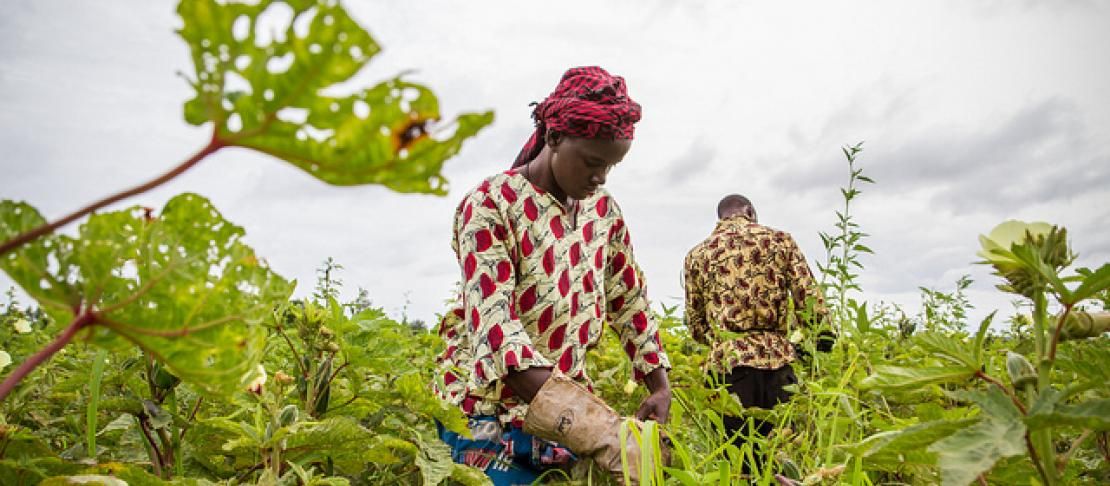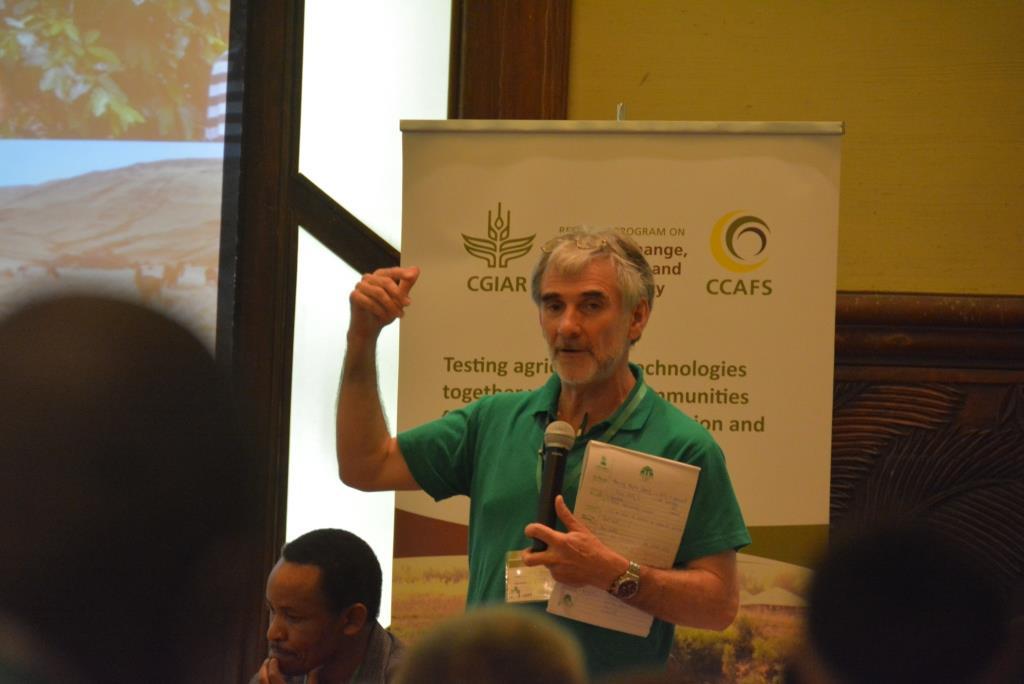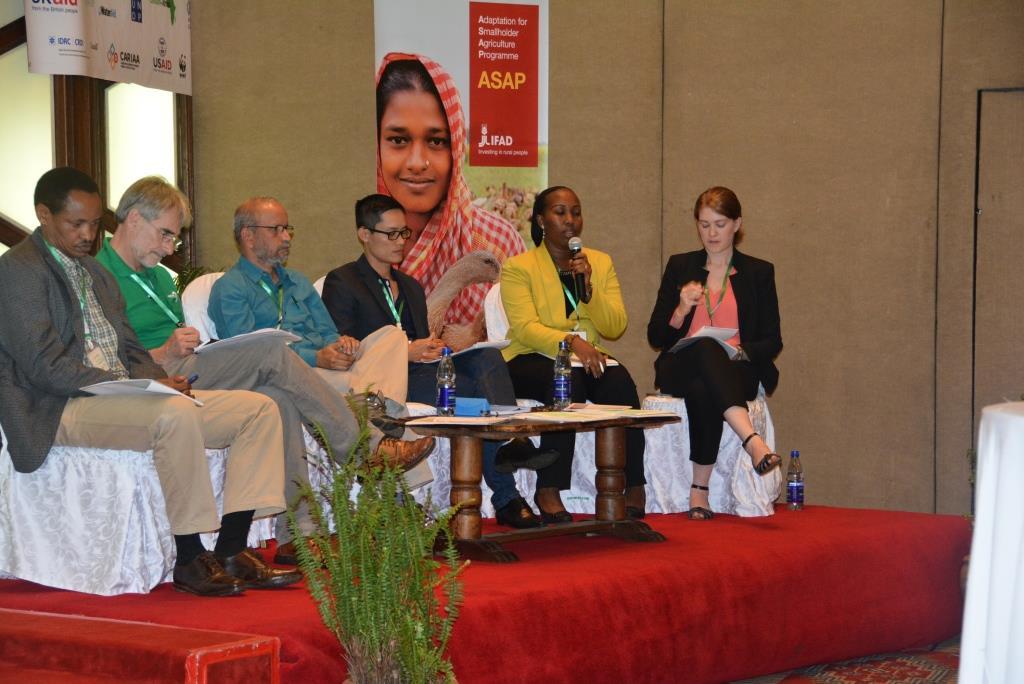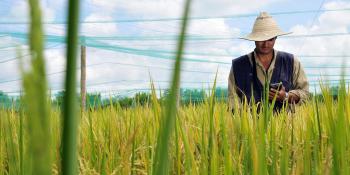How can climate-smart agriculture enhance food security and community-based adaptation?

Delegates who attended CBA9 in Nairobi agreed on the need to recognise and make use of indigenous knowledge from local communities and use this as a basis for building resilience.
Climate-smart agriculture (CSA) is a context-specific approach that takes into consideration the bio-physical and socio-cultural environment in which it is applied. This was the one of the key messages of the Session on Monitoring and Scaling up CSA practices for enhanced food security (FS) and community-based adaptation (CBA) at the recently concluded ninth International Conference on Community-Based Adaptation (CBA9).
The session was facilitated by James Kinyangi from the CGIAR Research Program on Climate Change, Agriculture and Food Security (CCAFS) and Estibalitz Morras from the International Fund for Agricultural Development (IFAD). The aim was to provide a platform for CBA9 participants to share and discuss their experiences around CSA to achieve food security, increase resilience and enhance community-based adaptation globally.
Linking CSA and CBA for technology justice
According to Chris Henderson from Practical Action, CSA is gaining acceptance and momentum. It appears to be taking centre stage in the delivery of agricultural development assistance. For many, CSA is often linked to new technologies that deliver immediate productivity or adaptation benefits – however this often bypasses the marginalized and smallholders, or has only short-term benefits. This is why we need to ensure CSA is relevant to CBA, especially to marginalized and smallholder farmers.
In that regard, the technologies and approaches need to be: accessible to smallholders (by building on the resources they already have); the natural capital must be sustainably used and lastly innovative – building on the wealth of local, traditional and indigenous knowledge and experience that already exists.
“The adaptation benefits of agro-ecological approaches, among others, can be a powerful tool for achieving adaptation, especially for resource poor, risk averse smallholders,” emphasized Chris during his presentation.

Chris Henderson from Practical Action SPEAKS ON APPROPRIATE TECHNOLOGIES FOR CSA AMONG LOCAL COMMUNITIES. PHOTO: V. Atakos (ccafs)
Practical Action is helping small-scale farmers through technology to build on their skills and knowledge to produce sustainable and practical solutions.
Integrating local and indigenous knowledge
Based on his experience working in the Mekong Delta, through the Project for Adaptation to Climate Change in the Mekong Delta (ADM), Pham Vu Bang from IFAD Vietnam called for the recognition and respect of local knowledge and involvement of community members in the planning process to ensure the prioritization of locally appropriate and sustainability of interventions. This is the approach applied in the ADM projects supported by the Adaptation for Smallholder Programme (ASAP) of IFAD.
In order to enhance the resilience capacity of rural poor communities, it was agreed that vulnerable groups and communities must be allowed to decide the best way for them to cope with the impact of climate change.
"New technologies is certainly a part of the solution, but should be linked to indigenous knowledge and farming systems to ensure and promote traditional value, biodiversity and culture or bio-cultural heritage” reiterated Bang.
The importance of incorporating local knowledge into CSA was further elaborated by John Mbaria from the Nation Media Group in Kenya who recommended the documentation and sharing of such knowledge and the integration of appropriate long-held community resource-use norms and practices into local government and national policy processes. With most food producers located in poorly developed rural areas, John noted that targeting local food production systems represented the biggest opportunity to increase food production, reduce vulnerabilities and improve livelihoods.
From the land of a thousand hills, Rwanda, Lucia Zigiriza who is working in the ASAP-supported project “Post-Harvest and Agribusiness Support Project (PASP), informed participants that communities in Rwanda are involved in the planning and monitoring of land restoration, which are informed by the National Strategy on Climate Change. Farmers are organized in cooperatives and this facilitates monitoring and also sharing of information. In order to address climate change effects, these farmers now have timely access to climate information such as seasonal and weekly forecasts to aid their decision making. The PASP project will provide incremental support for climate resilient post-harvest infrastructures and related investments that will focus on facilitating introduction of climate-smart post-harvest technologies and infrastructures. Notably, Rwanda is engaged in adopting and encouraging the CBA approach within existing national policies and sectorial strategies tackling climate change and promoting green growth economy.

Panelists during the session on monitoring and scaling up csa during cba9. Photo: V. aTAKOS (CCAFS)
Monitoring and upscaling CSA
Monitoring CSA should not be about the rate of technology transfer – e.g. the uptake of new ‘adapted’ or ‘improved’ varieties. It should be about measuring the capacity of farmers and communities, especially marginalised and smallholder farmers, to identify, develop and use different agricultural practices. It is their capacity that will enable them to respond to unpredictable climate-related changes and make better farming and livelihood decisions in the long-term.
Vijayasankaran from Samaj Pragati Sahayog in India pointed out that CSA is a holistic approach that requires multi-pronged investment and a multi-disciplinary approach towards participatory research.
"Water is the key to enhancing resilience of production systems to climate variability and climate change. Hence, public investment in water, especially low-cost solutions which could be taken up by smallholder farmers, lies at the core of CSA,” said Vijayasankaran.
While the role of private sector investments need to be emphasised, scaling up of small, scattered initiatives on CSA is not possible without incorporating these into national government programmes with substantial investments sustained over a period of time.
According to Caitlin Corner-Dolloff from the International Center for Tropical Agriculture (CIAT), many governments are currently working to mainstream CSA into national programs or policies. Consequently, CIAT, with support from CCAFS, is developing tools and frameworks for prioritizing investments in CSA. These processes must be stakeholder-driven and facilitate the linkage of national decision-makers with local realities and community priorities, running parallel prioritization processes across levels. Indicators used to evaluate ‘climate-smartness’ of practices or services are most effective at identifying priorities when selected with stakeholders. This ensures the criteria for successfully achieving food security, resilience, and low-emissions developed is incorporated. Scaling out CSA also requires iterative planning to use results of monitoring and evaluation of practices and altering CSA initiatives to adapt to changing conditions.
Watch video: James Kinyangi summarises session highlights
As a way forward, participants called for the upscaling of climate-smart practices and services that are working well. This will entail a careful assessment of the barriers to the uptake of these practices by local vulnerable communities. Also, governments, with support from non-governmental organizations, international agencies and research institutions, need to establish enabling environments, including incentives, to support community-based adaptation through climate-smart agriculture. The pitfalls of existing programmes for food security and climate change resilience could be addressed by recognizing the vital role of CSA in ensuring access to and sustainable use of innovative solutions by smallholder farmers.
Estibalitz Morras is a Portfolio Officer, Environment and Climate Division at International Fund for Agricultural Development (IFAD) while Catherine Mungai is the Partnership and Policy Specialist at CCAFS East Africa.



